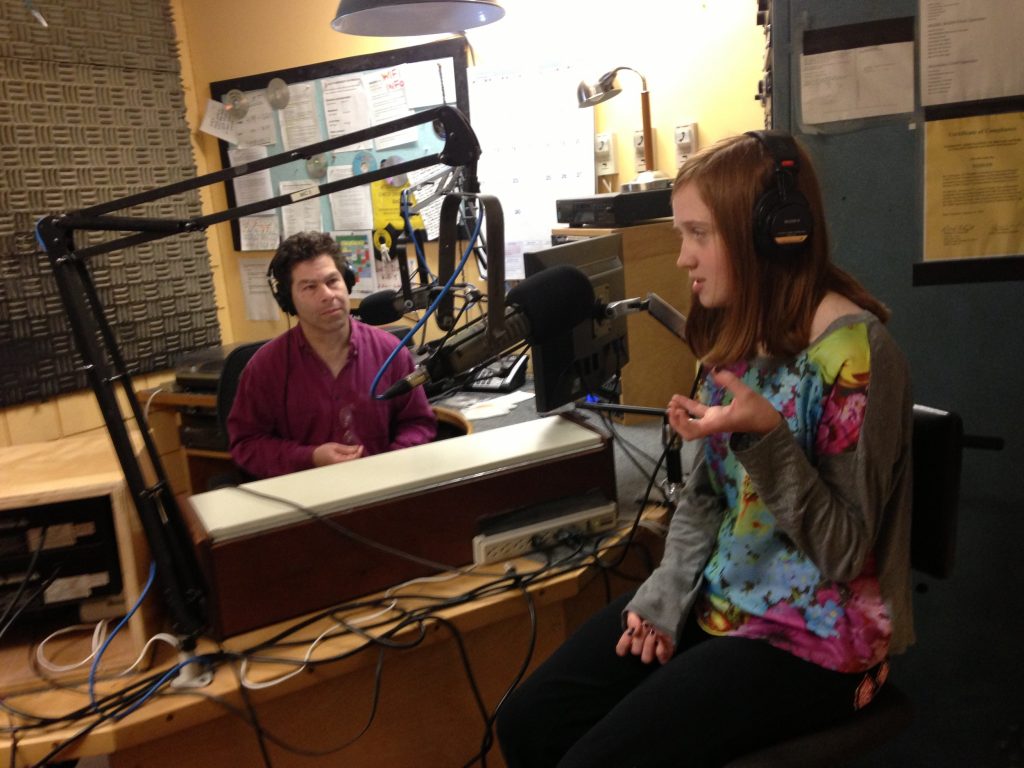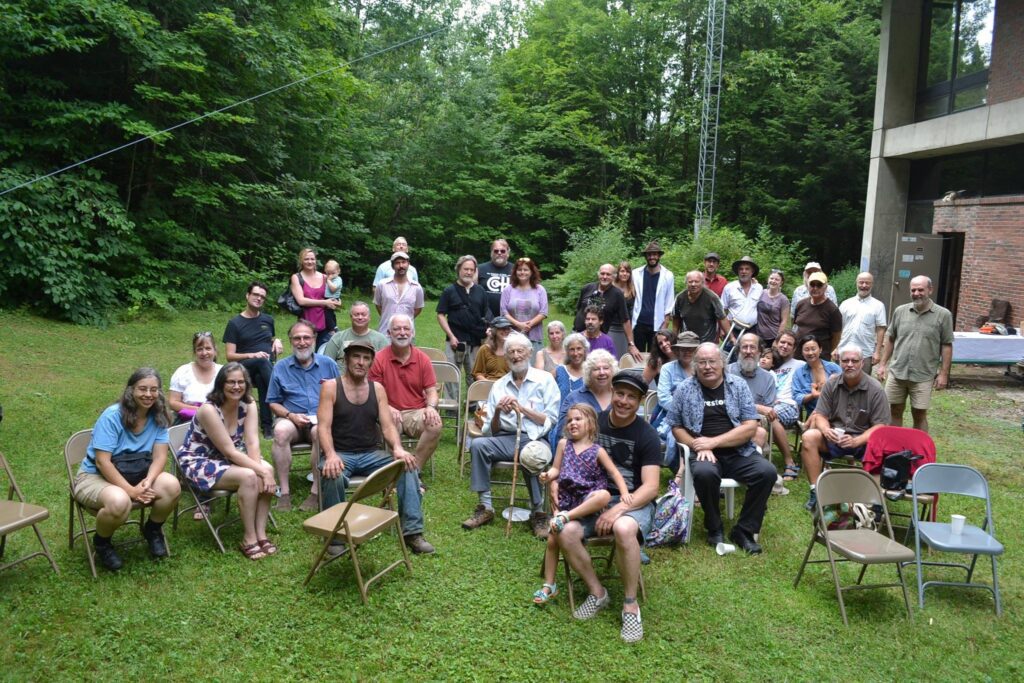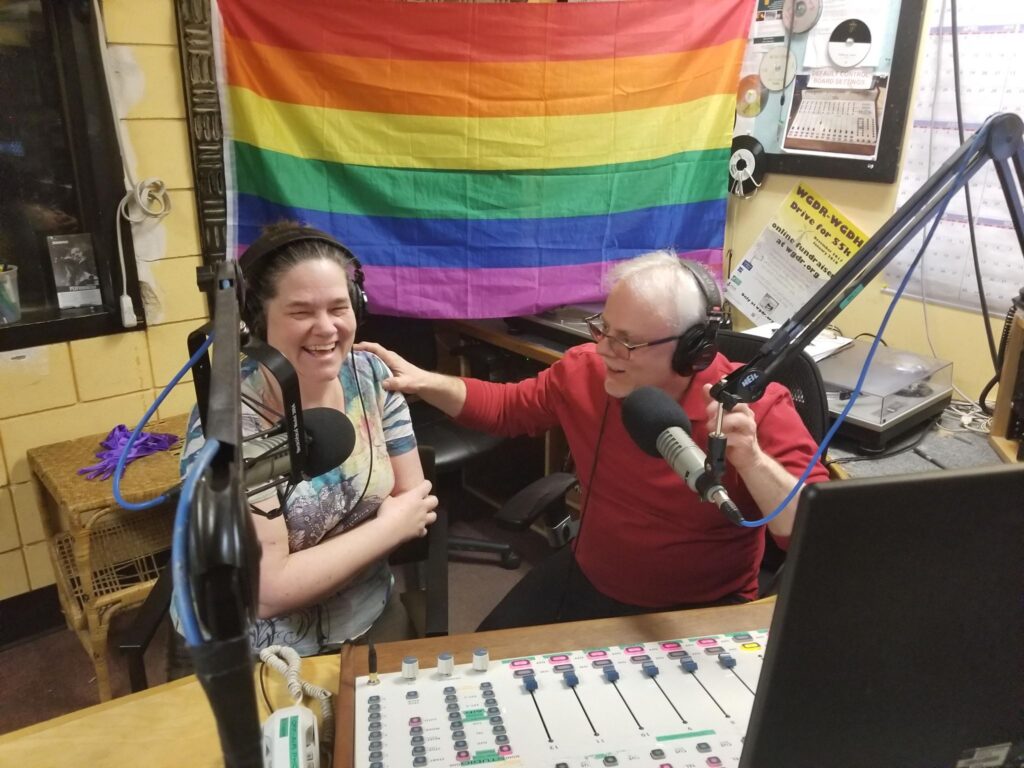WEC Community Fund grantee Central Vermont Community Radio weathers major transitions, keeping listeners thinking, jamming, and connecting
There’s a vibe, a sound to WGDR. It’s so Central Vermont. There’s this attentiveness to place, to community, to social justice, to having complicated conversations. The eclecticness of our programming is in tune with the community already. – Llu Mulvaney-Stanak
Central Vermont Community Radio is WGDR, if you’re listening in Plainfield, or from about Cabot to Northfield, skirting the top of Orange County. It’s WGDH, if you’re listening in Worcester, Woodbury, or the southern corner of Orleans County. For around half a century, Central Vermonters have tuned in to shows painstakingly programmed by their neighbors and broadcast from a basement station at Goddard College in Plainfield.
Since the spring of 2021, the radio station has officially operated under the nonprofit Central Vermont Community Radio. “I’ve described it much like running a start-up that’s 50 years old,” said station manager Llu Mulvaney-Stanak. Under Goddard’s auspices, the station leveraged a Corporation for Public Broadcasting grant as its primary funding source for years. But when the college moved to a low-residency model, it couldn’t justify charging students the activity fees that had provided funds required to match the grant, explained Rick Agran, who hosts the spoken word show “Bon Mot.” The funding loss forced the station and college to come up with new funding ideas. And according to Mulvaney-Stanak, budget pressures from the pandemic hastened a necessary transition.

(Courtesy Central Vermont Community Radio)
Goddard could have sold the station to the highest bidder. There are a limited number of radio frequencies, and they’re very valuable. WGDR/WGDH could have become “a radio clone,” said Agran, one of “300 stations across the nation saying the same thing at the same time. That’s terrifying to me.” But the college didn’t sell the station. Mulvaney-Stanak credits then-station manager Kris Gruen with advocating to Goddard leadership to let the listeners assume ownership of the station. It was a huge gift, Mulvaney-Stanak pointed out. “What Goddard did hasn’t really been done before: gifting it to the community, letting us continue to use the space,” they said.
So, quickly, community members came together to form the nonprofit board, do all the paperwork, meet FCC filings, fundraise, and continue to program shows – all remotely – as the pandemic continued.
And the community has come through. Through volunteer efforts, grantors like WEC’s Community Fund, and individual donations, Central Vermont Community Radio is finding the resources it needs to stay on the airwaves. Mulvaney-Stanak said they get notes all the time that show how embedded the station is in its community. A favorite said, “I love WGDR, and the chickens love it, too. I play it in the barn for them.”

(Courtesy Central Vermont Community Radio)
Radio personalities
Mulvaney-Stanak is a seasoned nonprofit consultant, though they may be as well known throughout Vermont as a DJ for events and radio. When they caught word that WGDR/WGDH was transitioning to community-owned radio, they offered to volunteer their services – and soon, the board was able to offer them a paid fundraising gig, and then asked them to manage the station.
It’s their dream job, they said, and it’s satisfyingly full-circle. “I got my start as a high school programmer on WGDR,” they remembered. “I grew up in Barre, and in high school my mom would drive me to Plainfield to do probably the worst radio show of the 90’s.” As their taste and expertise developed, they continued to stay involved in community radio, helping form low-power radio stations in Burlington and programming shows all the while. One thing that makes Central Vermont Community Radio special, they said, is that it’s a full-power station with substantial reach – different from most community-owned radio stations, which reach listeners in only about a 10-mile radius.
What else makes WGDR/WGDH special? Programmers who reflect back to the community exactly who they are. “There’s a vibe, a sound to WGDR. It’s so Central Vermont,” Mulvaney-Stanak said appreciatively. “There’s this attentiveness to place, to community, to social justice, to having complicated conversations. The eclecticness of our programming is in tune with the community already.” There’s the host who leaves kohlrabi outside the station door and invites listeners to come snag one. Music heads whose shows range from grassy Dead Hours to all-electronic instrumentation to freeform shows that refuse to stick to one genre.
There are also many talk shows. Some are on topics of intersectional community interest: the land and our relationship to it, rights and justice, current events, and experience – such as Indigenous life, queerness, feminism, childhood and parenthood.
Others are specifically steeped in art and culture. Rick Agran compiles his “Bon Mot” program thematically, like a scrapbook of recordings, weaving together clips from old records, internet spoken-word archives, music, and recordings he’s made in person of poetry readings and conversations.
Tonio Epstein, a WEC member from Middlesex, has programmed “Magical Mystery Tour” for about 10 years. Every week he reads a book, takes lots of notes, processes his notes, interviews the author, and then edits his hour-and-a-half long show down to an hour for syndication on the Pacifica network. “I interview authors who I find to be particularly interesting, creative, on the cutting edge of new ideas and new ways of approaching the problems of the world, people who are deeply caring and trying to bring about change and inspire others to live up to that in their own personal way,” he explained. He’s interested in education, parenting, psychology and neuroscience, and spirituality, and he likes to go deep into his conversations. “I get to read about things that I would be interested in, anyway. And now I can share it with people.”
Epstein finds much media toxic. Most media platforms bombard us with information, much of which is calculated to trigger a reaction in us, he explained, and frequently on topics that are outside our control. The breaking news cycle wears us down and makes us less tuned into our own communities, he suggested. He talked about this in reference to TV news, but it’s true of social media newsfeeds as well. “I just love the medium of radio. It allows a more personal engagement without having your nervous system hijacked so profoundly,” he said. And community radio is different still. “Our sources of media are extremely important, and we should be intentional about how we choose them,” he said. “For those reasons, WGDR is an important voice. It’s really important to have alternative issues and also different, alternative perspectives. It’s why I feel motivated to do all the work I do in my show to offer a counterbalance to the bombardment of horrors.”
An intimate broadcast
Community radio is a platform for holding conversations on topics overlooked by mainstream media. It’s also a platform for holding a community that can’t physically be together, as programmers and listeners found when beloved “Lost Highway” host Ken Feld died in February. The station held what Mulvaney-Stanak called a “live radio wake.” Programmers Dave Tucker and John Foster hosted a live show, playing music their friend used to play as family members and friends called in with remembrances. “We provided that connective power for two hours and did all those things that help create closure, sharing love of things, reminiscing. That’s the uniqueness and adaptability community radio can have,” Mulvaney-Stanak said.

(Courtesy Central Vermont Community Radio)
At the core level, Mulvaney-Stanak loves radio because of its intimacy. “As humans, we’re literally wired to connect to human voices,” they said. “When there’s no visual element to distract you, radio makes it just like, it’s me and you. I’m talking just to you, I’m playing just for you. You’re invited into the conversation in this undeniably intimate way. And most likely in Vermont, you know that person on the air, or you know who they are.”
The nature of community ownership, Mulvaney-Stanak suggested, points to a symbiotic relationship between WEC and Central Vermont Community Radio. Both were formed by people who realized that their communities were missing a key service and decided to provide it for themselves. For WEC, that was electricity; for WGDR, it was media. Both are owned by and accountable to their own community members.
This is why Central Vermont Community Radio appreciates ongoing support from WEC’s Community Fund, Mulvaney-Stanak said. “How we do anything is how we do everything,” they said. “That goes for what we put on the air, the vibe and culture of the station, and how we fund this and resource ourselves. When mission-aligned organizations support each other, we uplift the community. We show there are better ways to do things.”
Depending on your location, you can find Central Vermont Community Radio on the dial at WGDR 91.1 FM and WGDH 91.7 FM. You can also stream it at CentralVermontCommunityRadio.org.
To support Central Vermont Community Radio with a donation or volunteer interest, visit CentralVermontCommunityRadio.org.
Central Vermont Community Radio, 123 Pitkin Road, Plainfield, VT 05667
About WEC’s Community Fund
WEC’s Community Fund is made up entirely of member contributions. About 1,400 members choose to donate their capital credits to the Community Fund; others make donations out of pocket. This generosity allows WEC’s fund to make grants to small nonprofits in the Co-op’s service area.
To learn how to donate your capital credits, or to make a contribution to WEC’s Community Fund, call 802-223-2322 or email Rosie Casciero at rosie.casciero@wec.coop.
Community Fund Grant Recipients
- Adult & Teen Challenge of New England
- AWARE Domestic & Sexual Violence Service
- Barre Community Justice Center
- Barre Opera House
- Barre Partnership
- Boy Scouts Of America Green Mountain Council
- Bradford Public Library
- Brookfield Community Partnership
- Cabot Mentoring
- Center For an Agricultural Economy
- Central Vermont Adult Basic Education
- Central Vermont Career Center
- Central Vermont Council on Aging
- Central Vermont Home Health and Hospice
- Central Vermont Humane Society
- Chelsea Arts Collective
- Chelsea Public Library
- Connecting Hope
- Corinth Historical Society
- Danville Chamber Of Commerce
- Duxbury Land Trust
- Ecoforesters
- Faith In Action
- First Branch Ambulance
- Friends of The Mad River
- Girls/Boyz First Mentoring
- Good Beginnings of Central Vermont
- Good Samaritan Haven
- Groton Community Club
- Hardwick Area Food Pantry
- Hardwick Historical Society
- Hunger Free Vermont
- Jaquith Public Library
- Just Basics
- Kellogg-Hubbard Library
- Mad River Valley Recreation District
- Mad River Valley Rotary Club
- Make a Wish Foundation Vermont
- Montpelier Alive
- Neighbors in Action
- North Branch Nature Center
- Northeast Kingdom Council on Aging
- Old Brick Church
- Orange County Parent Child Center
- Peacham Library
- People’s Health & Wellness Clinic
- Plainfield Historical Society
- Prevent Child Abuse Vermont
- Roxbury Free Library
- Rural Vermont
- Salvation Farms
- Studio Place Arts
- T.W. Wood Gallery
- The Center For Grassroots Organizing
- The Veterans’ Place
- Toys For Tots
- Twin Valley Senior Center
- Twinfield Together Mentoring Program
- U-32
- Upper Valley Haven
- Vermont Agricultural Hall of Fame
- Vermont Center for Independent Living
- Vermont Community Garden Network
- Vermont Community Loan Fund
- Vermont Council on Rural Development
- Vermont Foodbank
- Vermont Granite Museum Stone Arts School
- Vermont Historical Society
- Washington County Mental Health Services
- WGDR / Central Vermont Community Radio
- Woodbury Volunteer Fire Department
- Worcester 4th of July Committee
- Worcester Historical Society
